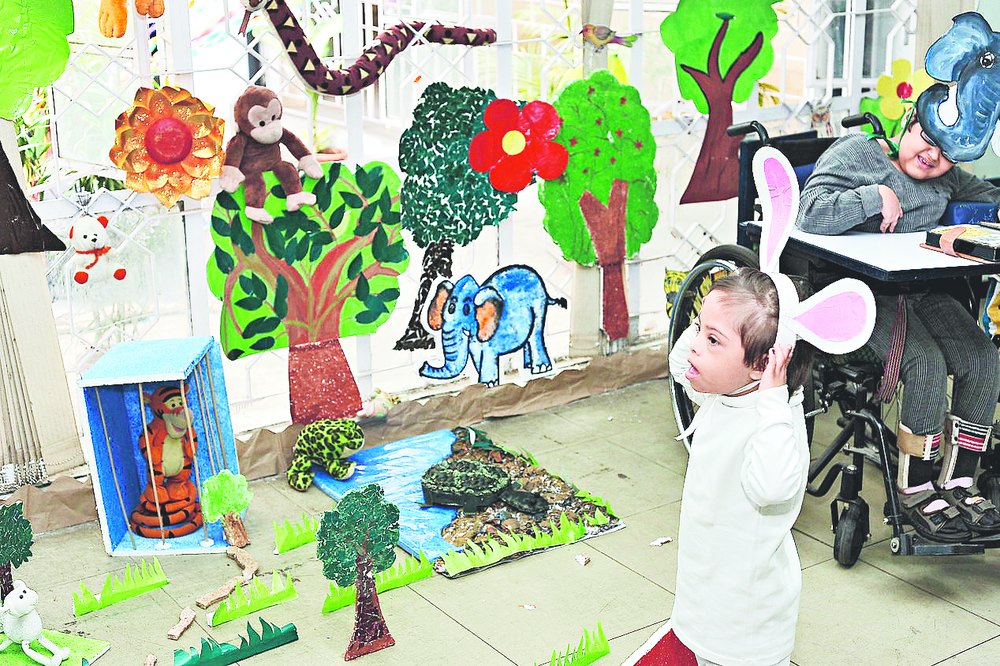From a two-room set-up in Ballygunge Military Camp with just a couple of students to a full-fledged campus in Taratala, Indian Institute of Cerebral Palsy has come a long way in 40 years.
The institute recently celebrated its journey with an exhibition that paid tribute to the city that has been home to it and all the people who have lent their support.
Samiran Nundy, gastro specialist from Delhi and guest of honour, remembered the special place IICP had in the life of his mother Shanti Nundy, the first qualified special educator at the institute.
For Raman Dhawan, GoC, Bengal, and the chief guest on the occasion, it was his first visit to IICP and he admitted to feeling “privileged” to be part of the 40th anniversary celebrations.
“It is this institute or institutes like this, the caregivers, the special children… the special adults who work for self-reliance… they are the actual heroes. We all need to applaud them,” said Dhawan. He also shared how the place once occupied by IICP at the Ballygunge Military Camp is now home to a special school. “They (IICP) were with us for a decade or so… I want to assure this institute, you may have left us to come to your new premises but you are very close to our heart. The place that you left, those two rooms… we made it into a slightly bigger establishment and there we run a small Asha school. A school for the special children of the armed forces,” Dhawan said.
Nundy took a trip down memory lane, remembering how his mother joined IICP at age 60 and how much she loved the institute. “At the age of 54 she enrolled herself in Brandon University in Canada and for three years she studied special education. When she returned to India in 1977, Sudha (Kaul) and Junie (Sethi) were very kind in employing someone who was nearing 60,” he said.
“My mother absolutely adored the school. She, I think, cooked, looked after the garden, looked after the children and she taught a little,” smiled Nundy. He also shared how even when her children were back home during holidays, she never used to miss out on work. “She would still be going out to work in the morning, saying ‘I can’t miss my job, I have to go to work whether my children are here or not’.”
Even after being diagnosed with cancer and undergoing treatment, she continued to work with IICP.
A short film, Beyond Barriers, by Jayabrato Chatterjee on IICP’s 40-year journey was screened on the occasion, followed by the release of the institute’s newsletter, Deepshikha, sponsored by ABP, where students, parents, teachers and people associated with the institute have shared their memories.
Jeeja Ghosh, an ex-student of IICP, gave a PowerPoint presentation on Ankur, an advocacy group she heads.
“Our parents and teachers have encouraged us. As we grew up we learnt to voice our rights and achieve our goals. We believe that people with disabilities have rights, the ability to shoulder responsibility and need to be recognised,” said Jeeja, who now works at IICP as head of advocacy and disability studies.
Madhuri Kapur, one of the first two students of IICP, was felicitated by vice-chairperson Sudha Kaul.
The exhibition titled Salaam Kolkata, which was on display at the Taratala campus, had students of the junior section put together Calcutta Canvas with vignettes of city life from phuchkawallah to animals from Alipore zoo.
source: http://www.telegraphindia.com / The Telegraph, Calcutta / Front Page> Calcutta> Story / by Shweta Keshri / Monday – December 22nd, 2014
